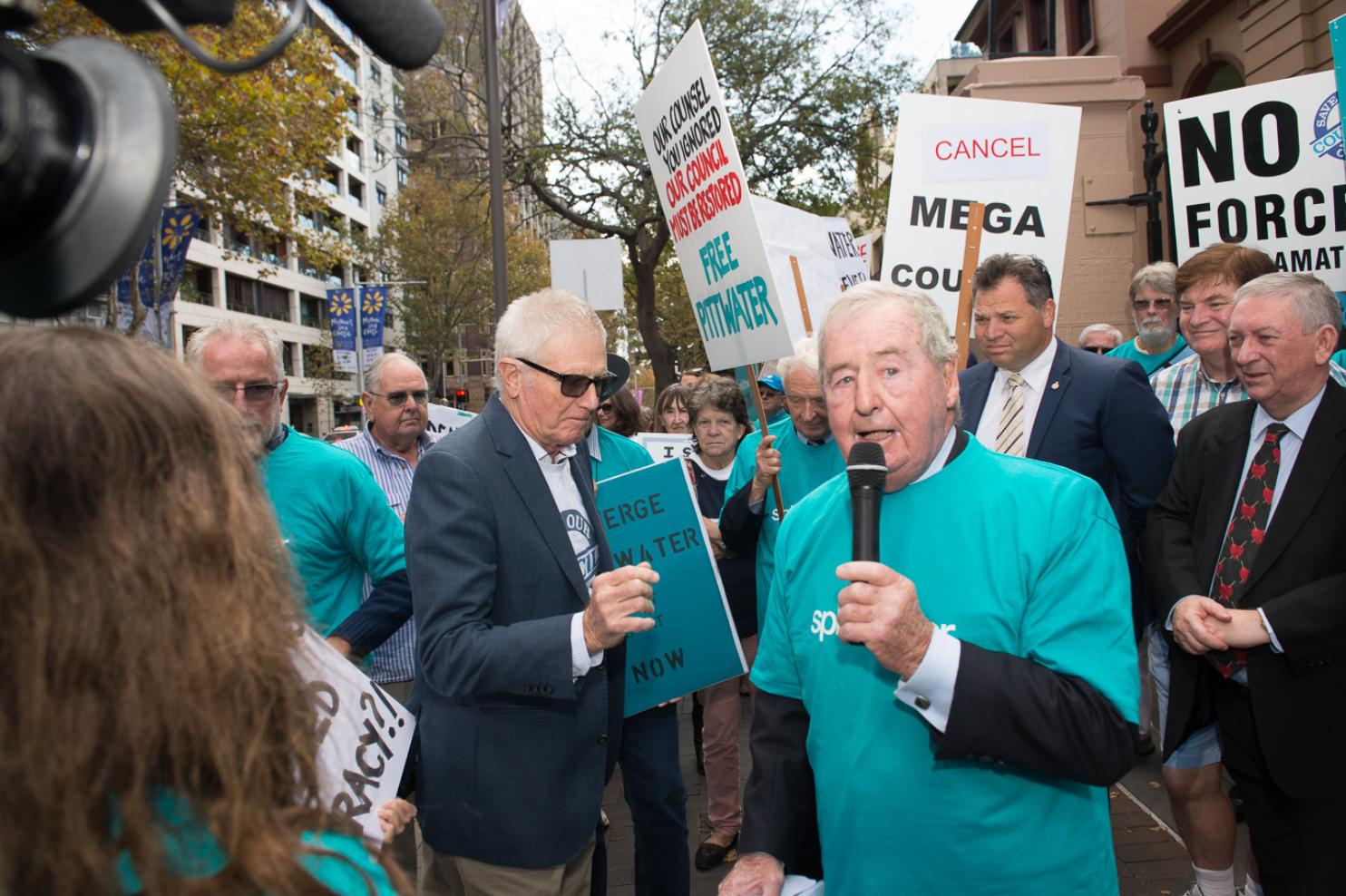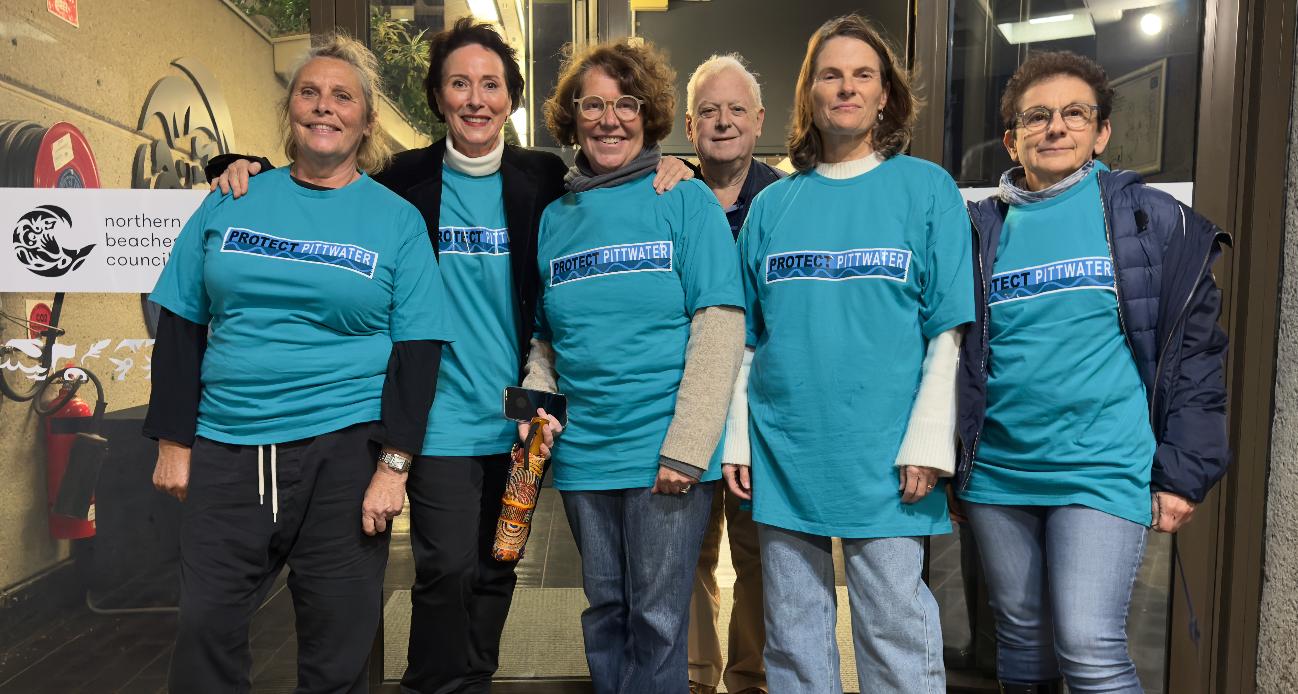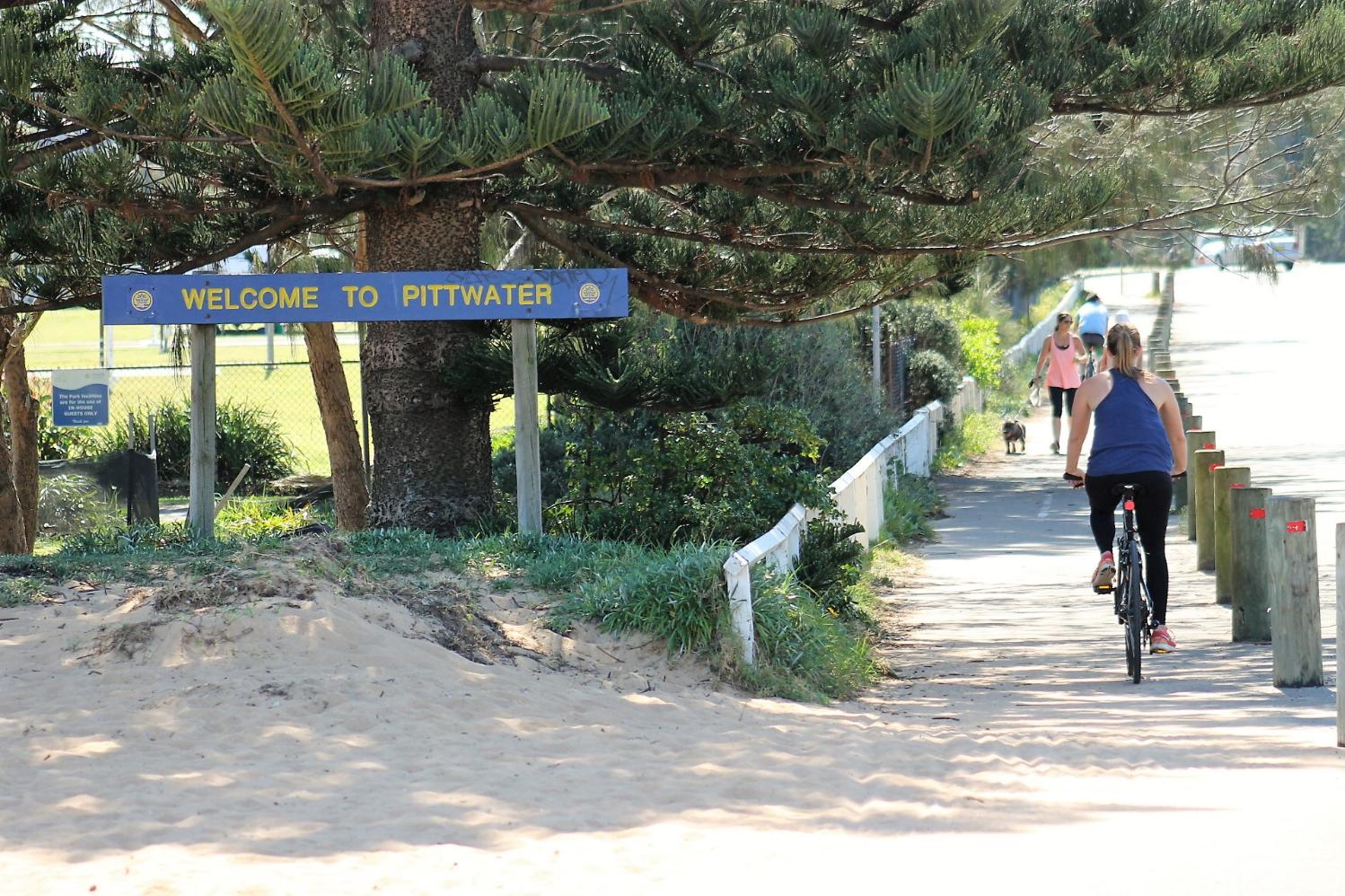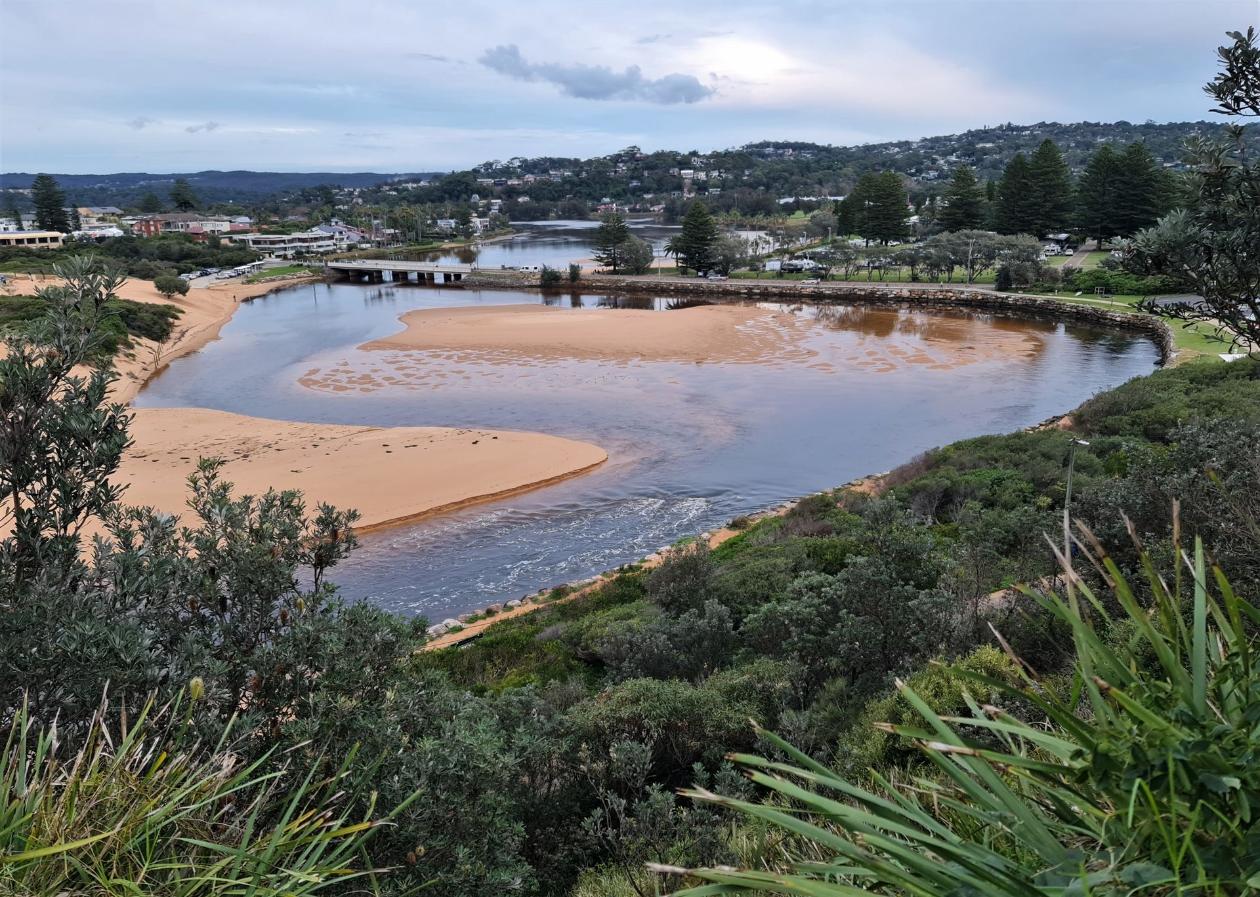Is Excising Public Land For Private Profit Now Ok?: The Joey + Whale Beach Restaurant Case Coupled With Spread Of Misinformation Met With Community Resistance - Minns Government Move To Override Whole NSW Community Prompts 'Something Smells Off' Response
However, there has been a considerable amount of misinformation and the situation is more complicated than the campaign being run by some 'news' outlets. The area on which The Joey is built is not part of Governor Phillip Park as it sits on the edge of Station Beach and protrudes into the waterways. It operates under a lease managed on behalf of the community by the Minister for Lands and Property. The adjacent land, which includes the landscaped area and carpark, is part of Governor Phillip Park and is Crown Land which Council manages under the required Plan of Management that applies to all Crown Land in New South Wales.
The Mean High Water Marks on the Ocean Beach and the Pittwater/Station Beach shoreline define the eastern and western boundaries of the park respectively. The southern park boundary is the northern public road reserve boundary of Beach Road. The northern park boundary is the southern boundary of Barrenjoey Headland, which is managed by the National Parks and Wildlife Service as part of Ku-ring-gai Chase National Park.
Within its 25 hectare area, Governor Phillip Park includes the Palm Beach Golf Course, North Palm Beach Surf Life Saving Club, the premises in which The Dunes restaurant is sited, car parking areas, sand dunes, picnic and barbecue areas, and a children's playground.
In a NSW Government Media Release of Tuesday May 7 2024 ' Striking a better balance on later trading applications' it is stated:
'Under the proposed Environmental Planning and Assessment Amendment (Vibrancy Reforms) Bill 2024, approved by Cabinet on Monday April 6 2024, councils and consent authorities will have to consider a set of ‘Vibrancy Guidelines’ when assessing certain applications to extend operating hours. This change would apply to food and drink premises situated on land which is 500m or more away from a residential property.'
Minister for Music and the Night-time Economy The Hon. John Graham said, as part of this release:
"The recent example of Northern Beaches Council turning down The Joey at Palm Beach from extending its hours based on concerns from residents over 500m away – and separated by a 9-hole golf course – brought this issue into sharp focus.
“We have listened to the community as a whole and this proposed reform should send a clear signal to local authorities that they need to strike the right balance between legitimate concerns over local amenity and the imperative to encourage businesses to trade and communities everywhere in NSW to have more options after dark.''
For that same date, in the Land and Environment Court Lists available on Friday May 3rd:
Barrenjoey Boatshed Pty Ltd v NORTHERN BEACHES COUNCIL
Date: 07 May
Time: 9:00 am
Case number: 2024/00116996
Listing type: Registrar Directions Hearing
The Hon. Paul Scully, the NSW Minister for Minister for Planning and Public Spaces, repeated the exact same statement on May 7 2024 at 6:08pm during his Second Reading Speech for the 'Environmental Planning and Assessment Amendment (Vibrancy Reforms) Bill 2024', which had been introduced minutes before into the NSW Parliament.
Then Law Council of Australia President, Fiona McLeod SC, stated in 2017:
"Australian politicians have traditionally, and quite correctly, been very careful to avoid any perception of attempting to influence the courts. This is a standard that should be upheld by every Member of Parliament,"
“Commenting on a matter that is currently before the courts could be perceived by members of the public as an attempt to influence the outcome and interfere with the court process.”
No mention of the case, Listed in the Court, was made in the May 7 media release or during the NSW Parliament Second Reading Speech given by The Hon. Paul Scully - however, Pittwater Online contacted Minister Grahams' office on Tuesday May 8 to ascertain whether the Minister was aware the venue, which seeks to operate 7am to 11pm 7 days a week, is sited in a Crown Land Reserve set aside for the public's use, and whether it is appropriate for an incumbent Minister to speak about a matter listed in NSW courts.
No response had been received as this Issue goes to press, Sunday May 12, 2024.
The second query could well be ignored as although on Friday May 4, 2024 and Saturday May 4 the matter was listed, (Case number: 2024/00116996, Barrenjoey Boatshed Pty Ltd v NORTHERN BEACHES COUNCIL) it has now disappeared completely from the NSW Court and Tribunal Lists.
Although the NSW Ministerial Code of Conduct asserts in its preamble and first paragraph NSW government ministers are required to “pursue and be seen to pursue the best interests of the people” of this state to “the exclusion of any other interest”, Barrenjoey Boatshed Pty Ltd v NORTHERN BEACHES COUNCIL must have been withdrawn on Monday May 6 - for some reason - leaving the Ministers free to cite The Joey at Palm Beach as their 'example' for introducing an amendment in the May 7 announcement.
The Environmental Planning and Assessment Amendment (Vibrancy Reforms) Bill 2024 is 'An Act to amend the Environmental Planning and Assessment Act 1979 to provide for the issuing of vibrancy guidelines, and the making of decisions about extended hours of operation for particular food and drink premises consistent with the guidelines.
The Amendment in the First Print reads:
Schedule 1[2] inserts proposed Schedule 8, Part 3. The proposed part provides that the Secretary of the Department of Planning and Environment (the Planning Secretary) may, after consultation with the 24-Hour Economy Commissioner under the 24-Hour Economy Commissioner Act 2023, issue guidelines (vibrancy guidelines). The vibrancy guidelines may provide for matters to be considered in determining extended hours of operation applications to enable venues to operate in a way that achieves their full social, business and cultural potential as part of the night-time economy. An extended hours of operation application includes—
(a) a development application that includes a proposal for extended hours of operation, and
(b) an application to modify a development consent to allow extended hours of operation.
The vibrancy guidelines must be considered by a consent authority in determining an extended hours of operation application.
Schedule 1[1] inserts a transitional provision that provides that proposed Schedule 8, Part 3 only applies to an extended hours of operation application made after the commencement of the proposed part.
Labours' De-Amalgamation Bill Passes With Help From The Coalition: Pittwater Residents Still Signing Up To Restore Pittwater Council

Rally on the day Protect Pittwater submitted the first petition signed by thousands of Pittwater residents - photo by Michael Mannington, OAM
NSW Labor passed amendments to the Local Government Act on May 9 which give the Minister for Local Government the ultimate say over whether councils can demerge or not.
Despite its pre-election promise to communities, Labor — with the support of the Liberal-National Opposition — has shifted power away from communities.
Brian Halstead, from NSW Demerge Alliance, said: “Labor MPs spoke at length about how forced council amalgamations had failed communities, especially those from small councils which had been swallowed up, but then rammed through amendments which centralise power with the minister.
“This is one hell of an about-turn from before the 2023 election, and communities will not forget Labor abandoning them.”
Halstead said an example of Labor’s scornful attitude was its removal of government liability to fully fund any demerger.
“Only because it needed the Opposition to get its bill passed did Labor accept the Liberals’ amendment of a cost contribution in the form of a grant, capped at $5 million with loans above that amount.
“This will help regional councils, but may not cover all expenses, thereby shifting the costs of a failed policy back onto residents — who mostly didn’t want their council amalgamated in the first place.”
Dr Amanda Cohn said the new demerger provisions fail to restore local democracy to allow communities to instigate referendums to demerge.
Cohn, a former Deputy Mayor at Albury Council, criticised Ron Hoenig, Minister for Local Government, for claiming to value democracy but proposing a bill “that gives himself more power than councils and communities”.
Cohn’s Local Government Amendment (De-amalgamation Plebiscites) Bill 2023, tabled in last November, would have enabled binding plebiscites on a demerger and clarified that the government would fund any deamalgamation.
But Labor and the Opposition refused to support her democracy-enhancing bill, producing its own in February.
The Greens moved amendments to the government bill in the Legislative Council on May 9, which were opposed by both Labor and the Opposition. The amendments to the government’s bill included:
- Binding the Minister to act on the result of a referendum on de-amalgamation. The government’s bill stipulates that a demerger progressing is at the Minister’s discretion.
- Allows electors to make a de-amalgamation proposal, which is critical where the amalgamated council itself does not support demerger. This framework is essential to recover the lost voices of smaller communities whose councils were amalgamated into larger councils - as examples, Pittwater, Guyra, Bombala, and Urana.
Minister for Local Government, The Hon. Ron Hoenig stated during the Second reading debate in the lower house:
‘I have heard from people from Pittwater and other people who want to demerge, that they have submitted previously in 2016, 2017 or 2008, or they have submitted proposals under section 215 to the Government and have been told that they need 10 per cent of an entire area, and that is how section 215 is being interpreted. If they were told that, it is wrong. If it is an approach to the Office of Local Government while I am the Minister, I will proceed in accordance with the Act. I have a sneaking suspicion why they might have been told that and why they think it is accurate, but it is wrong.
I thought I was clear at budget estimates that there is an opportunity to proceed under section 215. I do not need to read the words to the House a third time for it to be clearly understood. I say clearly to all those who think that they do not have an opportunity that they can proceed under section 215. If 250 people in Pittwater signed a request under section 215, I am not sure on what basis they would persuade a Minister for Local Government to refer that to the boundaries commission, but the opportunity is there to have the Minister at least consider it, as a Minister is required to do.’
Pittwater residents in their thousands signed a petition which was to then Local Government Minister Gabrielle Upton in May 2018. The original petition – legally a proposal under the NSW Local Government Act - did not need to be presented to Parliament but should have been passed on to the Office of Local Government for consideration.
However, despite numerous phone calls and emails asking for an urgent response, the Protect Pittwater group did not receive a written answer until January 2020 and the proposal was then knocked back by the NSW Office of Local Government, who informed the residents they now had to get 10% of the whole newly created LGA to sign - not just from those within the former boundaries of their former council area.
A report run the week before the group finally heard back stated that the 20 amalgamated councils around the state had lost $1.03 billion in three years and Northern Beaches Council was the fifth worst performing amongst them. Recent Budget discussions for the current NBC Budget reveal this has not improved.
Pittwater Council was dissolved by the NSW government on May 12, 2016, against the wishes of 89 per cent of local residents and despite being financially sound.
Labors' bill means that a de-amalgamation must be led by the council created when those they had been were forcibly merged.
Labor’s new bill means that even after a council goes through producing a business case, goes through the NSW Boundaries Commission process and has a referendum, the Minister has the power to veto all of that.
Ms Cohn said communities in Bombala, Canterbury Bankstown, Central Coast, Cootamundra-Gundagai, Guyra, Inner West, Pittwater, Hilltops and Tumbarumba have been “campaigning to restore local democracy for seven years and they will continue to campaign for council de-amalgamation and for local democracy to be restored”.
The changes will require councils to develop a robust business case for de-amalgamation with community input so that residents are adequately informed of potential implications upfront. The business case must consider the impacts of de-amalgamation including financial ramifications, long-term strategic plans, and the capacity of new councils to deliver services.
Pittwater residents have been stating since the Northern Beaches Council was created that services have diminished - despite large increases, annually, to rates.
The Minister will then refer the business case to the Local Government Boundaries Commission for independent review and assessment. If the Minister is satisfied by the Boundaries Commission’s recommendation a proposal is sound, a compulsory referendum may then be held to give the community the final say on whether they wish to de-amalgamate.
The majority of the community, again across the whole of those created councils, must support this vote for the demerger to proceed.
The new legislation will also apply to any council that has been amalgamated, removing a provision that placed a 10-year period for councils to enact demerger proceedings.
It also provides for a mechanism for the Government to contribute to funding the costs of demergers incurred by councils.
Despite the apparent frustration of getting Pittwater council back the changes present, communities like Pittwater will still have the option of collecting signatures to petition for a de-amalgamation.
Since the last one was 'MIA' until instantly rejected, thousands more have signed a new petition - determined to have the real benefits, real democracy, real services and real say in local matters they experienced under Pittwater Council restored.
Now all the community-led move to have their council restored needs is to right to have any vote taken to be restricted to that former LGA area, not applied across the whole of that created where, since 2016, the 'numbers game' has ignored the community.
''We went from our own council with nine councillors that represented the Pittwater area to three councillors in a council of 15. The concerns which are Pittwater specific are now basically ignored because of the numbers game. When we were amalgamated, 63,000 Pittwater residents were immediately disenfranchised. Local government is supposed to be a democratic system which provides a forum for citizens to vent their concerns on issues that directly affect them.'' - a resident of Pittwater
Anna Maria Monticelli, Secretary of Protect Pittwater, said on Friday May 10:
"The defeat this week in State Parliament, that would have given a clear and fair pathway for previous councils like Pittwater to demerge from mega councils like the Northern Beaches – is a public betrayal by political parties. The years of promises and waffle has ended up in denying us “a say” and snookering any community attempts to restore our rights.
The major parties have worked together and structured an endless series of legal hurdles that even if successfully navigated, could be denied at the last minute by the Minister of Local Government on a whim with no accountability.
The only way forward, in my opinion, is to forget political parties and their so called promises and elect candidates who have an iron clad commitment to restoring Pittwater Council.
We want people in power that represent Pittwater not political parties.
This issue will not go away, in fact the decisions made this week will only galvanise further support for demerging as the problems of amalgamation and lack of services keeps growing and growing."


We consider the only future for this area and for the preservation of those ideals and policies for which we stand is to become an independent Shire … the need for this electoral reform has been clearly and sufficiently demonstrated to enable the Government to come to a decision and no longer forestall the issue. Put simply we call upon the Government to put the matter now to the people of A Riding to determine.
Warringah Shire Councillors Robert Dunn and Eric Green, representing A Riding - 1990
Photo: 'Welcome to Pittwater signage at North Narrabeen, where the Pittwater Council LGA commences, in 2013
Autumn In Pittwater

Past Features Archives (pre 2014)
Pittwater Online News was selected for preservation by the State Library of New South Wales and National Library of Australia. This title is scheduled to be re-archived regularly.
Archived Issues (2014 on) may be accessed here: pandora.nla.gov.au/tep/143700
Past Issues are also listed on site on the Community News page, by month.
